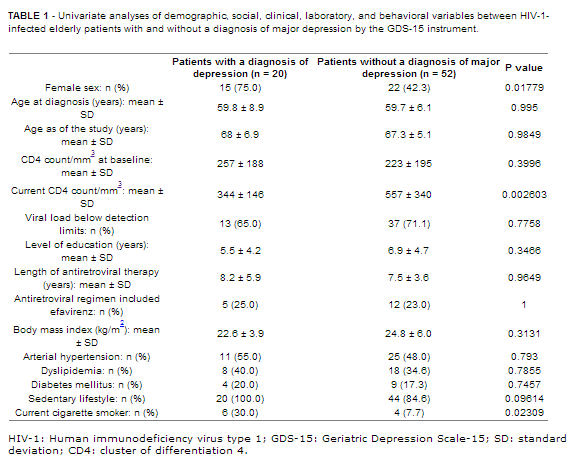Article
Depression May Worsen Antiretroviral Treatment Adherence Among HIV-Infected Elderly
Author(s):
Following previous research that detected a greater risk of major depressive disorder development in HIV-infected patients, a new study examined the psychiatric condition's effect on adherence to antiretroviral therapy.

Following previous research that detected a greater risk of major depressive disorder development in HIV-infected patients, a study published in the June 2013 edition of the Journal of the Brazilian Society of Tropical Medicine examined the psychiatric condition’s effect on adherence to antiretroviral therapy.
For their “Factors Associated with a Diagnosis of Major Depression among HIV-Infected Elderly Patients” analysis, a team of Brazilian researchers from the School of Medicine and Surgery at the Federal University of the State of Rio de Janeiro compared 20 HIV-infected geriatric patients diagnosed with major depression to 52 HIV-infected patients aged 60 years and older who were not diagnosed with depression.
At the conclusion of the study, the authors recorded “no statistically significant difference between the two groups when the variables of age at diagnosis of HIV-1 infection, age at the start of the study, level of education, CD4 cell count at baseline, viral load below detection limits during the study, current use of an efavirenz-including antiretroviral regimen, body mass index, arterial hypertension, diabetes mellitus, and dyslipidemia were studied on univariate analyses.” However, the researchers discovered that the depressed patients “were more likely to be women, have a lower CD4 cell count during the study, and be current smokers.” (Table 1)

Even though the prevalence of viral loads below detection limits did not differ between depressed patients and non-depressed patients, the investigators suggested that the low CD4 cell counts identified in those diagnosed with major depression may have resulted from poorer antiretroviral treatment adherence.
“Physicians caring for HIV-infected elderly patients should be aware that depressive symptoms may pose barriers to successful antiretroviral therapy and immune reconstitution,” the authors concluded. “Since antidepressant treatment has been shown to be effective in the setting of HIV infection, the present data underscore the need to attentively screen for and treat major depressive symptoms among the growing population of elderly HIV-infected individuals.”
2 Commerce Drive
Cranbury, NJ 08512
All rights reserved.




